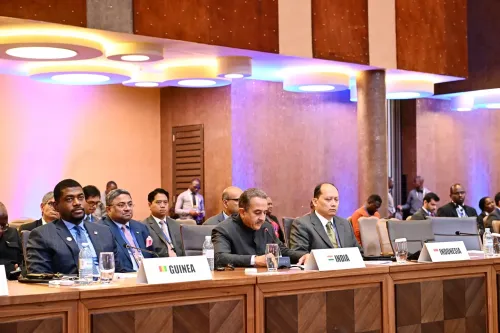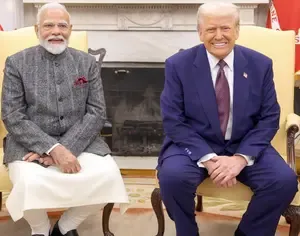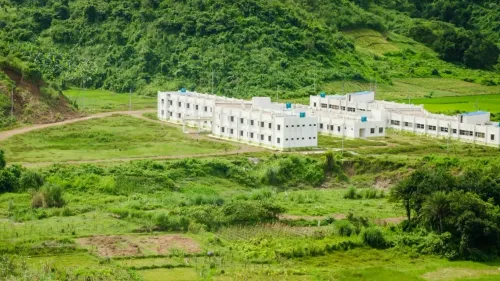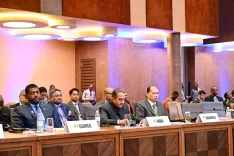Is Bangladesh on the Brink as the Army Confronts the Jamaat-Controlled Yunus Regime?
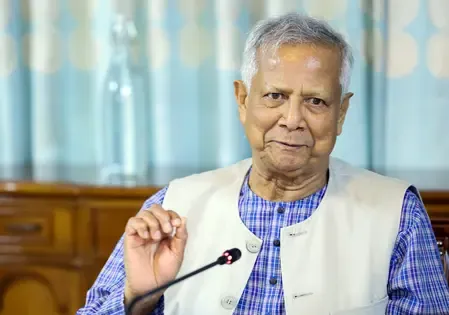
Synopsis
Key Takeaways
- A confrontation is brewing between the Yunus regime and the Bangladesh Army.
- 24 army officers face arrest warrants from the ICT, raising tensions.
- The Jamaat-e-Islami exerts pressure on the government to manipulate the ICT.
- The army remains a crucial stabilizing institution in Bangladesh.
- Experts warn of potential revolts if the situation does not change quickly.
New Delhi, Oct 16 (NationPress) A significant clash looms on the horizon between the Muhammad Yunus regime and the Bangladesh Army. While an uneasy tranquility lingered for a while, tensions have escalated following the International Crimes Tribunal (ICT)'s issuance of arrest warrants against 24 army officers.
The ICT has accused these officers of involvement in enforced disappearances, torture, and clandestine detentions, leading to considerable frustration within military ranks.
Army Chief General Waker-uz-Zaman is under immense pressure from his officers, prompting the cancellation of his planned visits to India and Saudi Arabia.
The roots of this turmoil can be traced back to Jamaat-e-Islami, which has been pressuring Yunus to manipulate the ICT for its own agenda, even though the tribunal was originally established by Sheikh Hasina, who was overthrown last August in a revolt.
Initially created to prosecute those responsible for crimes during the 1971 Liberation War, the tribunal's focus has shifted to prosecuting individuals involved in enforced disappearances and extrajudicial killings during Hasina's administration.
Notably, the chief prosecutor of the ICT, Tajul Islam, who once defended Jamaat members, is now leading prosecutions aimed at avenging the executions of some of its affiliates. The ICT is increasingly perceived as a tool for targeting those associated with Hasina.
In this scenario, the army is caught in the crossfire, and the arrest warrants have ignited outrage within its ranks.
Experts observing Bangladesh note that the army currently represents the last bastion of sanity in the nation, displaying remarkable restraint amidst chaos. It has adhered to constitutional principles and even established an interim government to manage affairs until elections could be conducted.
However, the army did not foresee that Yunus, chosen by the student-led uprising, would become a mere pawn of the Jamaat. The Jamaat's objective is to replace the army with the radical Islamic Revolution Army (IRA), a move met with resistance by the army, which fears that the IRA would disregard the Constitution and pave the way for the imposition of Sharia Law.
Yunus and the Jamaat are actively working to undermine the army, fully aware that such ICT orders, viewed as a witch-hunt, could incite unrest within the military. This could create a pretext for introducing the IRA under the guise of a destabilized army.
Compounding the army chief's challenges, some members have become compromised by ISI influence, effectively putting them under Jamaat control. An Indian official has indicated that this might be the gravest crisis the army has faced since its inception. The army chief finds himself isolated within the interim government, and there are growing concerns about radicalization, which, if widespread, could trigger a revolt.
In light of these developments, the Bangladesh Nationalist Party (BNP) has warned Yunus against antagonizing the army, emphasizing the necessity of maintaining a balance and fostering good relations with military leadership. Salahuddin Ahmed, a BNP standing committee member, stated that they cannot afford any risks.
Nonetheless, the Jamaat remains obstinate, continuing its witch-hunt against army officials and members of the Awami League. Since Hasina's departure, not only has the Awami League been banned, but numerous leaders have also been imprisoned. The blatant nature of these actions places Bangladesh in a precarious situation, with experts warning of potential revolts not only within the army but also among the populace if changes do not occur swiftly.

